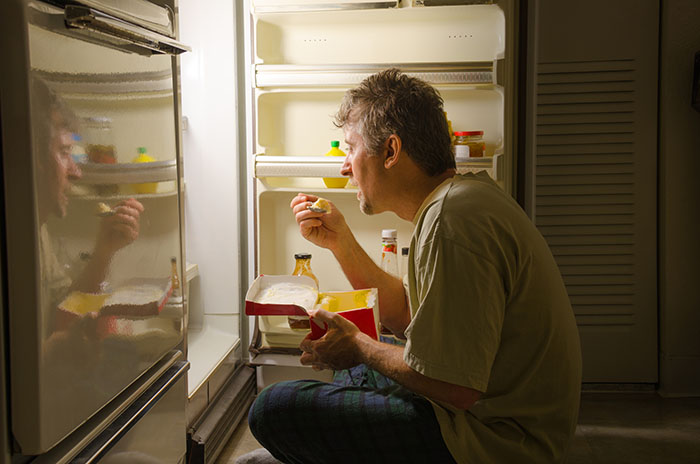Overeating in the evening can be a daunting challenge that many individuals struggle with. As the day winds down and we finally find ourselves with a moment of reprieve, the allure of indulging in excess food can become difficult to resist. In our previous blog we wrote about Discover the Impact of Social Media on Body Confidence. In this blog post, we will delve deep into the science behind how to stop overeating in the evening, explore the significant role emotions play in triggering such behavior, and provide a range of effective strategies to help you regain control over your eating habits.
Understanding Overeating in the Evening
 The phenomenon of overeating in the evening is influenced by a combination of biological, psychological, and environmental factors.
The phenomenon of overeating in the evening is influenced by a combination of biological, psychological, and environmental factors.
Biologically, the body’s metabolism naturally tends to slow down as the day progresses, making it easier for us to consume more calories than our bodies truly require.
Psychological factors also come into play, as the stresses and demands of the day often lead us to seek comfort in food during the evening hours.
Additionally, the environment we’re exposed to can significantly impact our choices, with cues from advertisements and the social atmosphere often promoting indulgence during this particular time.
The Role of Emotional Eating in Evening Overeating
 Emotional eating serves as a powerful trigger for overeating in the evening.
Emotional eating serves as a powerful trigger for overeating in the evening.
It’s a behavior rooted in the innate desire for comfort, distraction, and temporary relief from emotional distress.
Emotions such as stress, anxiety, boredom, loneliness, and sadness can each play a substantial role in driving us to consume excess food during these hours.
This emotional connection can lead to a cycle where food is used as a temporary coping mechanism, followed by subsequent feelings of guilt and regret.
Recognizing this cycle is fundamental to addressing and managing overeating behaviors effectively.
Identifying Common Emotions that Trigger Overeating:
- Stress: The demands of the day often lead to seeking relief in food.
- Anxiety: Feelings of unease drive individuals to turn to food for comfort.
- Boredom: A lack of engagement can result in mindless snacking and overeating.
- Loneliness: Emotional emptiness is temporarily filled by consuming food.
- Sadness: Comfort foods are frequently used to alleviate feelings of sadness.
Exploring the Emotional Eating Cycle
The emotional eating cycle typically involves a trigger, followed by the consumption of food for comfort, temporary relief, and eventually, feelings of guilt or regret.
Breaking this cycle requires recognizing triggers and actively finding alternative ways to manage emotions and stress.
How to Stop Overeating in the Evening
1. Building Awareness and Mindfulness
 Building awareness around your eating habits is the crucial first step towards overcoming overeating in the evening.
Building awareness around your eating habits is the crucial first step towards overcoming overeating in the evening.
Begin by recognizing the emotional triggers that prompt you to turn to food during these hours.
By identifying these triggers, you empower yourself to intervene before succumbing to unhealthy habits.
Another effective method involves maintaining a food and emotion journal.
This practice helps you establish a clear connection between what you eat and your emotional state, aiding in spotting patterns and potential pitfalls.
Moreover, practicing mindful eating techniques can greatly impact your relationship with food. Slow down your eating, savor the flavors, and pay attention to your body’s hunger cues.
2. Healthy Meal Planning and Preparation
 Crafting a strategic approach to meal planning and preparation plays a pivotal role in curbing evening overeating.
Crafting a strategic approach to meal planning and preparation plays a pivotal role in curbing evening overeating.
Prioritize balanced meals throughout the day to ensure your body receives essential nutrients earlier on, reducing the likelihood of overcompensating in the evening.
Delve into the art of creating satisfying and nutritious evening meals.
Incorporate lean proteins, vegetables, and whole grains that not only nourish your body but also satiate your cravings.
However, while embracing healthier choices, it’s crucial to avoid extreme restrictions.
Strive for moderation rather than deprivation, as overly restrictive diets often lead to intensified cravings and eventual overindulgence.
By planning your meals thoughtfully and embracing a balanced approach, you can build foundation on healthy eating habits during at night.
3. Creating a Supportive Environment
 Your surroundings wield a significant influence over your eating habits.
Your surroundings wield a significant influence over your eating habits.
One effective strategy is to stock your environment with healthy options.
Ensure that a variety of nutritious snacks are readily available, making it easier to choose wisely when cravings strike.
On the flip side, consider minimizing exposure to trigger foods by keeping them out of sight.
This simple act reduces temptation and promotes healthier choices.
Engaging family or household members in your quest for healthier eating can also be transformative.
Encourage everyone to embrace these habits collectively, fostering a supportive environment that reinforces positive choices.
By aligning your environment with your goals, you create a conducive setting that aids in breaking the cycle of overeating.
4. Stress and Emotion Management
 Managing stress and emotions effectively is a key strategy in your endeavor to conquer overeating in the evening.
Managing stress and emotions effectively is a key strategy in your endeavor to conquer overeating in the evening.
Incorporating stress-relief techniques into your daily routine can greatly reduce the impulse to turn to food for comfort.
Engaging in practices such as yoga, meditation, or deep breathing exercises can create a sense of calm that acts as a buffer against emotional eating triggers.
Furthermore, dedicating time to relaxation practices is essential.
Whether it’s indulging in a warm bath, immersing yourself in a good book, or practicing mindfulness, these activities provide alternative avenues for coping with stress and emotional turmoil.
And should the need arise, don’t hesitate to seek professional help.
5. Distraction and Alternative Coping Mechanisms
 Discovering healthier ways to cope with emotions is paramount in preventing overeating.
Discovering healthier ways to cope with emotions is paramount in preventing overeating.
One effective technique is to find engaging activities that divert your focus away from food.
Whether it’s pursuing a creative hobby, taking a brisk walk, or engaging in a satisfying workout, these activities offer alternative outlets for emotional energy.
Additionally, consider pursuing hobbies and interests that resonate with you.
Such endeavors not only keep your mind occupied but also offer a sense of fulfillment that food cannot replicate.
When emotions trigger the urge to overeat, having a list of positive distractions at your disposal can be a game-changer.
Expert Insights and Tips
 Gaining insights from experts in the field can provide invaluable guidance on conquering evening overeating.
Gaining insights from experts in the field can provide invaluable guidance on conquering evening overeating.
Registered dietitians, psychologists, and specialists offer a wealth of knowledge to aid your journey towards healthier eating habits.
When addressing specific emotional triggers, consider tailoring your strategies to suit individual circumstances for more effective outcomes.
These experts emphasize the significance of professional recommendations in breaking the cycle of evening overeating.
By incorporating their insights, you can harness practical advice to navigate the complexities of emotional eating triggers, transforming your relationship with food and fostering lasting positive changes in your overall well-being.
Conclusion
Taking control of overeating in the evening necessitates an in-depth understanding of the underlying causes, as well as proactive strategies for managing emotional eating triggers.
By building awareness, embracing mindful eating practices, and creating a supportive environment, you can regain control over your eating habits.
It’s essential to remember that seeking guidance from experts and adopting alternative coping mechanisms are integral steps towards fostering a healthier relationship with food.
By following these multifaceted strategies, you’ll be well-equipped to break the cycle of evening overeating, setting yourself on a path towards enhanced well-being and a more balanced lifestyle.
Are you tired of the never-ending battle with evening overeating, where the allure of indulgence seems irresistible as the day winds down?
In this blog, we've delved deep into the science behind overeating in the evening, exploring the emotional triggers that drive this behavior.
But now, it's time to take control with the PrimaJust weight loss method.
Unlock your metabolism for all-natural weight loss, effortlessly shedding 1-3 pounds per week without the need for diets or exercise.
Don't let evening overeating hold you back any longer.
Download our free report today and discover the exact method to transform your relationship with food and achieve lasting well-being.
Don't wait; your healthier future starts now!
[Source]Free Report
Comment below if you’re interested in learning more about effortless weight loss.
Attain a new level of enlightenment with these essential related blog posts
-
Triggers for Emotional Eating: Effective Workplace Strategies
Emotional eating is a common phenomenon that involves using food as a way to cope…
-
Emotional Eating: Unveiling Triggers and Effective Strategies
Emotional eating is a common phenomenon where individuals turn to food to cope with their…
-
How to Stop Emotional Eating from Stress: 10 Effective Strategies
Emotional eating is a common response to stress, where individuals turn to food for comfort…














